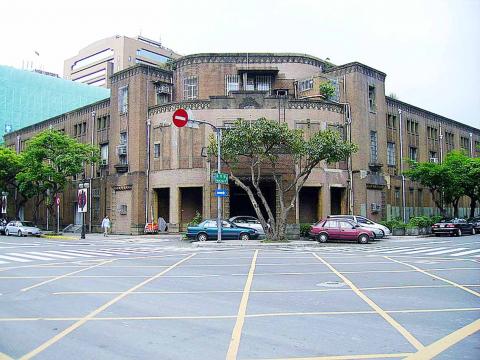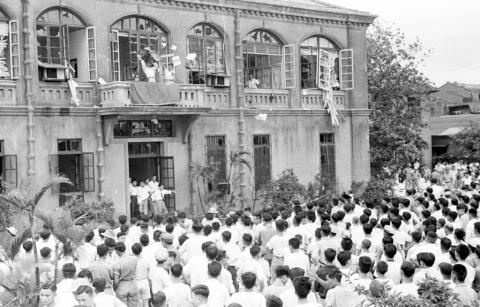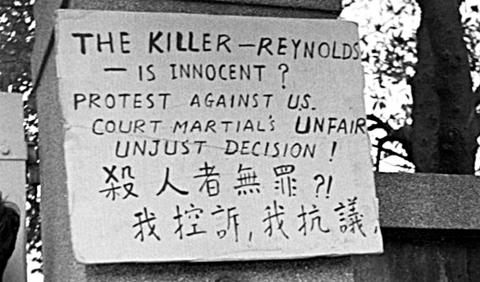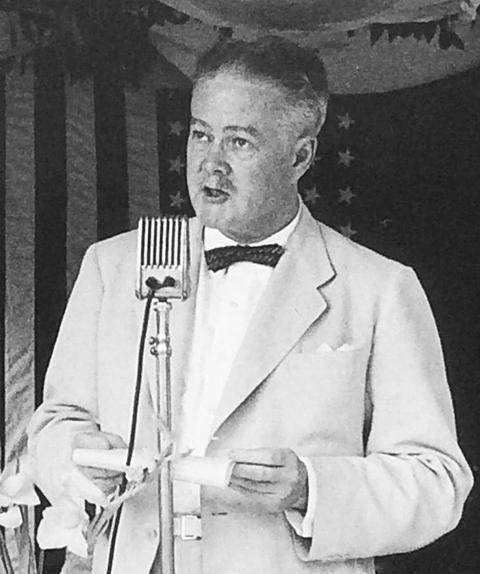May 21 to May 27
Cars were overturned, furniture was destroyed and an American flag was ripped and thrown off the second floor balcony of the then-US embassy in Taipei. The angry crowd wreaked havoc on the building for nearly 10 hours before the authorities dispersed the protesters — leading the Americans to wonder if the May 24, 1957 attack was orchestrated by the government.
“In a city notorious for its elaborate secret services and policing agencies ... why was a riot such as this permitted to go unchecked for hours?” writes George Kerr in Formosa Betrayed, noting that certain people were warned of possible trouble days in advance and that the incident happened while president Chiang Kai-shek (蔣介石) was on a mountain retreat, US Ambassador Karl Rankin was in Hong Kong and the army’s chief officers were visiting the offshore islands.

Photo courtesy of Wikimedia Commons
The incident was in response to the killing of government employee Liu Tzu-jan (劉自然) by US soldier Robert Reynolds, who allegedly discovered Lee in his garden peeping at his wife, who was taking a shower. Reynolds claims that Lee attacked first with a stick, and he fired two fatal shots in response. There were no witnesses with little evidence, and Reynolds was acquitted by an American military court to the applause of Americans in the courtroom and flown out of the country on May 23.
The United Daily News (聯合報) reported that the nation was in shock over the ruling, and that “resentment and agitation has permeated every corner of society.”
The paper further stated in an editorial, “Protesting the US Army’s Disdain for Human Rights” (抗議美軍蔑視人權): “We can’t help but question US law and the Americans’ lofty ideals of protecting human rights. Otherwise, it simply means that the life of an American has far more value than one of [ours]. Liu is dead, and Reynolds runs free. Isn’t that the bloody truth?”

Photo courtesy of Wikimedia Commons
Dressed in black, Liu’s widow stood in front of the embassy the next morning to protest the ruling. This attracted a crowd as things quickly escalated and went out of control.
AMERICAN ACCOUNT
Both Chiang and Rankin later reflected on the incident. Chiang’s public speech made that July regarding the riots can be found in the National Central Library, while Rankin provides an account in his memoir, China Assignment.

Photo courtesy of Wikimedia Commons :
Rankin had returned to Taiwan during a lull in the riots. The embassy was empty then, but the crowd was still there, throwing stones at his car.
“The buildings were gutted. Everything inside that could be lifted had been thrown out the doors and windows … my personal car was on its side, with a safe dropped on it from the floor above,” he writes. “The police begged us to leave. There were very few of them, and they feared that a new incursion might start at any moment.”
Rankin notes that he was able to account for all his staff by 7pm that night — they had avoided harm by hiding in an air raid shelter and were later escorted out by the police. Only one was hospitalized.

Photo courtesy of Wikimedia Commons
Rankin later told US news station CBS that Taiwanese officials were too slow in providing adequate protection, and asked for “full compensation and an adequate apology.”
In the following weeks, 111 people were arrested, with about 40 receiving sentences of six months to one year. Rankin does not speak of any conspiracy or premeditation in his account.
“My eventual conclusions were quite simple,” he writes. “There had been no serious public disorder in Taiwan for 10 years, and internal security had become lax. The city authorities were not prepared to deal with a large mob, either in terms of equipment or numbers of police.”
He also notes that the only people who could have given orders for the army to act — namely Chiang and the Minister of Defense — were not available at that time.
“We were satisfied that while some of Liu’s friends and his widow had planned a small demonstration in the hope of a cash settlement from the US, the outbreak of violence had been spontaneous,” he concludes.
THE GENERALISSIMO SPEAKS
Of course, Chiang’s speech begins with a bunch of anti-Communist rhetoric, but he quickly cut to the chase: “In the past six months, not only have we not been able to achieve any concrete achievements, we have exposed the weaknesses in all levels of our government and brought the greatest shame to our country in 60 years — the ignorant, useless, shameless and pathetic riots that took place in Taipei on May 24.”
He chastises the people and his staff in a long tirade, saying that it has greatly affected the goal of retaking China by attacking their American allies.
“To be honest, we cannot withstand another blow to our international standing, which has turned us into the laughingstock of the world,” he says. “I personally believe that after this incident, our international friends have less trust in us, and domestically, this will be a great chance for people who oppose our party to denounce us.”
Chiang says that the riots could have been avoided if the military police had taken action once people started gathering outside the embassy and contacted their superiors immediately, adding that nothing was reported until the attacks were already under way. He was especially angry that the Taipei Police Department never made an official report to City Hall, greatly slowing the spread of information to other departments. He blasted the convoluted chain of command within the government structure, and also denounced the government’s incompetence in dealing with the immediate aftermath of Liu’s killing, leading to the Americans taking over the investigation and acquitting Reynolds of wrongdoing.
The rest of the speech is a long and winding lecture on how the government has grown idle since retreating to Taiwan and that it should always stay alert and keep up with modern ideas and technology because they must not forget the ultimate goal of defeating the Communists.
“If all departments can follow even 50 percent of my instructions and teachings over the past seven years, I believe that there will not be another May 24 Incident,” he says.
At the time of the incident, Taiwan and the US were still hammering out the details of the Status of Forces Agreement with the Republic of China, which included whether US staff and soldiers were immune from Taiwanese jurisdiction.
Law professor Chiu Hung-dah (丘宏達) writes in a study on the agreement that the US agreed that Taiwan would have jurisdiction over “members of the US armed forces or civilian component and their dependents.” However, Taiwan waived its primary rights to exercise jurisdiction except for certain cases, including security offenses against the government and offenses against Taiwanese citizens, including murder, robbery and rape.
Check out the following link for a video of the riots by the Associated Press: www.youtube.com/watch?v=VANq_EXvZj4
Taiwan in Time, a column about Taiwan’s history that is published every Sunday, spotlights important or interesting events around the nation that have anniversaries this week.

June 9 to June 15 A photo of two men riding trendy high-wheel Penny-Farthing bicycles past a Qing Dynasty gate aptly captures the essence of Taipei in 1897 — a newly colonized city on the cusp of great change. The Japanese began making significant modifications to the cityscape in 1899, tearing down Qing-era structures, widening boulevards and installing Western-style infrastructure and buildings. The photographer, Minosuke Imamura, only spent a year in Taiwan as a cartographer for the governor-general’s office, but he left behind a treasure trove of 130 images showing life at the onset of Japanese rule, spanning July 1897 to

One of the most important gripes that Taiwanese have about the Democratic Progressive Party (DPP) is that it has failed to deliver concretely on higher wages, housing prices and other bread-and-butter issues. The parallel complaint is that the DPP cares only about glamor issues, such as removing markers of Chinese Nationalist Party (KMT) colonialism by renaming them, or what the KMT codes as “de-Sinification.” Once again, as a critical election looms, the DPP is presenting evidence for that charge. The KMT was quick to jump on the recent proposal of the Ministry of the Interior (MOI) to rename roads that symbolize

In an interview posted online by United Daily News (UDN) on May 26, current Chinese Nationalist Party (KMT) Chairman Eric Chu (朱立倫) was asked about Taichung Mayor Lu Shiow-yen (盧秀燕) replacing him as party chair. Though not yet officially running, by the customs of Taiwan politics, Lu has been signalling she is both running for party chair and to be the party’s 2028 presidential candidate. She told an international media outlet that she was considering a run. She also gave a speech in Keelung on national priorities and foreign affairs. For details, see the May 23 edition of this column,

On the evening of June 1, Control Yuan Secretary-General Lee Chun-yi (李俊俋) apologized and resigned in disgrace. His crime was instructing his driver to use a Control Yuan vehicle to transport his dog to a pet grooming salon. The Control Yuan is the government branch that investigates, audits and impeaches government officials for, among other things, misuse of government funds, so his misuse of a government vehicle was highly inappropriate. If this story were told to anyone living in the golden era of swaggering gangsters, flashy nouveau riche businessmen, and corrupt “black gold” politics of the 1980s and 1990s, they would have laughed.